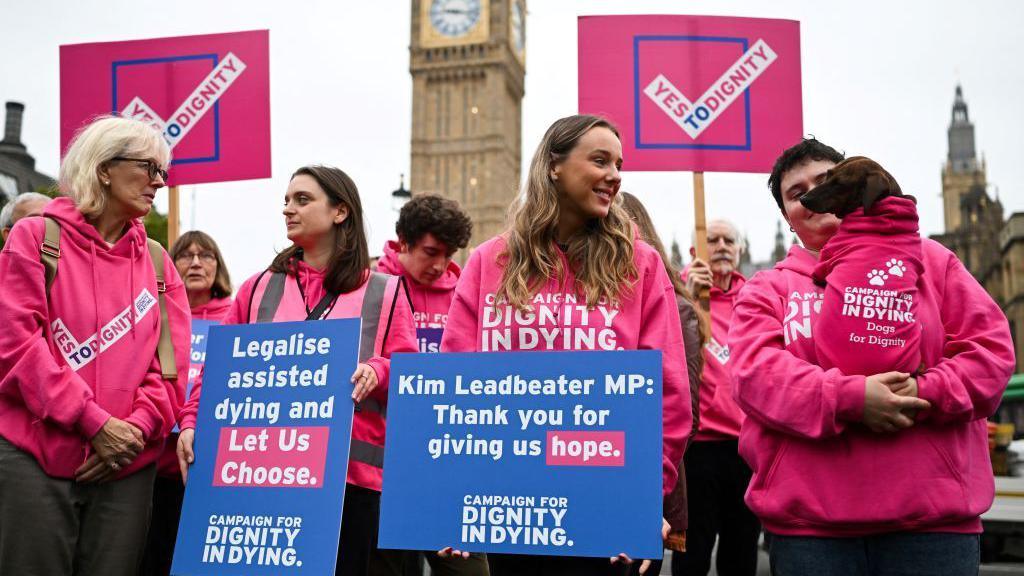Assisted dying law would hit other NHS care - Streeting

- Published
Health Secretary Wes Streeting has ordered officials to look at the costs for the NHS of implementing any changes in the law on assisted dying.
Streeting, who plans to vote against a new assisted dying bill when it is debated later this month, has suggested what is proposed could lead to cuts in other NHS services.
The bill, published on Monday, would allow terminally ill adults expected to die within six months to seek help to end their life if two doctors and a High Court judge verify they are eligible and have made their decision voluntarily.
The policy would have "resource implications" which would "come at the expense of other choices", Streeting told Times Radio.
Assisted dying could stop harrowing deaths, says MP behind bill
- Published12 November 2024
'I might be dead before a decision is made': Terminally-ill people on assisted dying
- Published12 November 2024
Speaking to the NHS Providers conference in Liverpool, Streeting said: "I've asked my department to look at the costs that would be associated with providing a new service to enable assisted dying to go forward."
The department said it had not begun a formal review, but assessing the impact of potential new legislation was “regular policy work”.
Streeting also said he was worried about a "chilling slippery slope argument" if people felt compelled to end their own lives as a cost-saving measure.
But he added: "Regardless of my own personal position or my own vote, my department and the whole government will respect the will of Parliament if people vote for assisted dying."
'Implications'
Streeting had earlier warned that financing assisted dying would come at the expense of other NHS services.
Asked by Times Radio whether he would have to find money from elsewhere if the bill became law, Streeting said: "Yep, to govern is to choose.
"If Parliament chooses to go ahead with assisted dying, it is making a choice that this is an area to prioritise for investment. And we'd have to work through those implications."
He said the health service would "need to work through with the medical profession what would be a very new way of working".
"No one should be compelled, for example, to take part in assisted dying if they have got moral or ethical objections as clinicians. That certainly would be one of my red lines".
Streeting has repeatedly expressed his view that the palliative care system is not "where it needs to be to give people a real choice".
Downing Street declined to confirm if he was right about assisted dying costs impacting NHS services.
The prime minister's spokesperson said it was "a matter for Parliament to decide" after debating "the issues surrounding the Bill".
Free vote
The assisted dying bill has been introduced by Labour MP Kim Leadbeater, who argues her legislation is the "most robust" in the world. She has said she expects hundreds of dying people to apply if it is available.
Critics of her measure have raised fears of coercion and a slippery slope to wider legislation taking in more people.
Speaking on Tuesday, Leadbeater rejected these claims, saying her bill had “three layers of scrutiny,” requiring sign-offs from two doctors and a High Court judge, and made coercion punishable by up to 14 years in prison.
Only terminally-ill adults with less than six months to live who have a settled wish to end their lives would be eligible under the new law.
MPs are scheduled to debate and vote on the bill on 29 November.
The prime minister, a former director of public prosecutions, has previously supported assisted dying, but the government has pledged to remain neutral on the issue, and MPs are being allowed to vote according to their conscience rather than along party lines.
This will be the first Commons vote on assisted dying since MPs rejected allowing terminally ill adults to end their lives under medical supervision in 2015. As a backbench Labour MP, Streeting voted in favour of that measure.
If the bill passes its first vote later this month, it will receive further scrutiny from MPs and peers, who could choose to amend it.